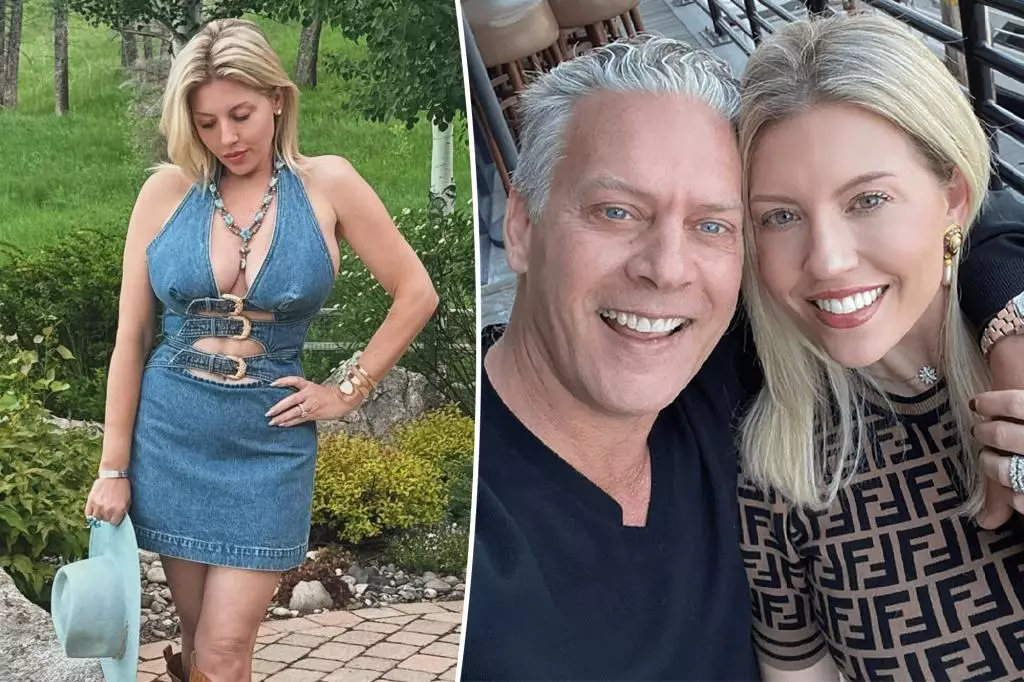In the world of celebrity, public personas are often carefully crafted masks that conceal the complex, often painful realities underneath. The recent legal clash between David Beador and his estranged wife Lesley reveals a grimmer picture — one where veneer of glamour and stability erodes amid accusations of violence, deception, and manipulation. Such disputes lay bare the fragility of relationships built amid the glitz, exposing the raw, sometimes ugly truths that social media and televised fame tend to obscure.
This case exemplifies how the glamorous life we see on screens masks deeper conflicts. David, previously known as the ex-husband of “Real Housewives of Orange County” star Shannon Beador, now finds himself embroiled in allegations that go well beyond typical divorce disputes. The accusations he has levied against Lesley — claiming physical abuse and labeling her a pathological liar — challenge the narrative of a harmonious separation. Conversely, Lesley’s own filing for protection presents a picture of ongoing verbal abuse and emotional harassment. Both sides portray themselves as victims, but in reality, this battle highlights the universal difficulty in disentangling truth from perception within the arena of fame.
This ongoing saga underscores that even those living seemingly privileged lives are not immune to emotional trauma and destructive relationship dynamics. Instead of a fairy tale, what appears is a complex maze of resentment, accusations, and distrust that spirals into a damaging courtroom drama. When the perfect lifestyles are scrutinized through the lens of legal filings, the underlying issues — control, insecurity, or greed — often come to the fore, revealing that wealth and status do little to shield individuals from relational dysfunction.
The Power of Allegation and the Impact on Personal Identity
In this case, the power dynamic is palpable. David’s claims that Lesley married him for money and his detailed recounting of violent episodes serve to undermine her credibility and reinforce a narrative of exploitation. Yet, Lesley’s allegations of verbal abuse and harassment depict David as an unstable figure capable of emotional harm. These conflicting versions of reality highlight how accusations of violence, whether physical or verbal, are often used as weapons in escalating disputes — weaponization that can cause irreparable damage to personal identities and reputations.
The emotional toll is compounded when children are involved. The custody arrangement, with stringent directives like a 100-yard separation and restrictions on contact, reflects the serious concern for protecting the innocent from the turbulence of adult conflicts. For a four-year-old girl, Anna Love, these disputes are a reality that shapes her childhood, demonstrating how even in the limelight, children are often casualties of adult conflicts. The way each parent frames the situation also influences how the daughter perceives her parents and her understanding of relationships, rendering these legal battles as more than just disputes; they are shaping her entire worldview.
This ongoing chaos shatters the idealized notion that wealth or social stature guarantees stability or happiness. Instead, it surfaces the harsh truth that personal insecurities, greed, and emotional fragility can erode even the most outwardly successful marriages. The battle now appears as a contest not merely of accusations but of control over narratives, reputation, and ultimately, their family’s future.
The Question of Authenticity in a Manufactured World
Ultimately, the saga of David and Lesley raises critical questions about authenticity and the construction of personal identities in the age of celebrity culture. Behind the headlines and legal documents lies a fundamental query: Are these disputes genuinely reflective of their true selves, or have they been amplified or distorted by public exposure and media spectacle? The answer, elusive and complex, reveals that beneath the surface, personal struggles are often amplified by the desire for control and validation.
While society might focus on sensational details—violence, infidelity, or greed—what remains overlooked is the emotional fragility that fuels these conflicts. In the high-pressure environment of fame, individuals can become prisoners of their own reputations, risking everything in battles that often do more harm than good. The Beador case exemplifies how easily personal issues can spiral into public spectacles, leaving scars that aren’t visible but are deeply felt. It is a stark reminder that fame does not exempt anyone from the fundamental human struggles of trust, love, and respect — struggles that, if left unchecked, can destroy even the strongest façades.
This narrative challenges us to reflect on the broader implications of the celebrity obsession with perfect images and transactional relationships. Behind closed doors, the reality is often far messier, and the price paid for maintaining a “perfect” image can sometimes result in emotional devastation far more profound than the shiny veneer suggests. Fame may buy attention and luxury, but it offers little protection from the pain of broken trust, damaged relationships, and the relentless pursuit of control over one’s narrative.

Leave a Reply